

EdWeek SJSD Day 1: Karl Fisch. EdWeek SJSD How Do We Help Out Students Create Their Own Personal Learning Networks? EdWeek SJSD What Should Students Know and Be Able to Do? EdWeek SJSD What Does It Mean to Be Literate?
Adjusting the Prescription. Principal 2.0 – Becoming the lead learner. Open Educator Manifesto. [Version I: Just the Manifesto] ‘We’ educate future citizens of the world Teaching is my professional practice.
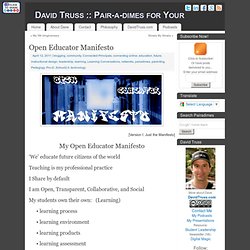
And What Do YOU Mean by Learning? So, the biggest learning news coming from the Richardson household last week has, as is more often the case than not, little to do with the classroom and everything to do with doing. Two quick stories, both involving my 13-year old daughter Tess: Story 1 Three weeks ago, Tess decided (on her own) to go out for the track team, something she had never done before.
The Machine is Us/ing Us (Final Version) A Vision of Students Today. Digital Ethnography » Blog Archive » Revisiting “A Vision of Students Today” Shift Happens — Now What? Our Googley advice to students: Major in learning. Management guru Peter Drucker noted that companies attracting the best knowledge workers will "secure the single biggest factor for competitive advantage.
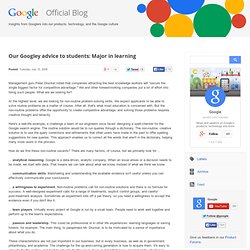
" We and other forward-looking companies put a lot of effort into hiring such people. What are we looking for? At the highest level, we are looking for non-routine problem-solving skills. We expect applicants to be able to solve routine problems as a matter of course. Teaching for the 21st Century:What Would Socrates Say? Peter W.
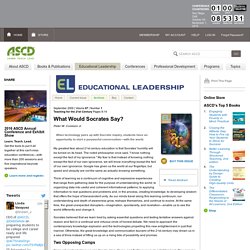
Cookson Jr. Socrates believed that we learn best by asking essential questions and testing tentative answers against reason and fact in a continual and virtuous circle of honest debate. Expecting Excellence:Rigor Redefined. In the new global economy, with many jobs being either automated or “off-shored,” what skills will students need to build successful careers?
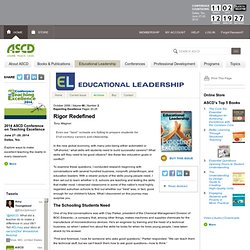
What skills will they need to be good citizens? Are these two education goals in conflict? To examine these questions, I conducted research beginning with conversations with several hundred business, nonprofit, philanthropic, and education leaders. With a clearer picture of the skills young people need, I then set out to learn whether U.S. schools are teaching and testing the skills that matter most. I observed classrooms in some of the nation's most highly regarded suburban schools to find out whether our “best” was, in fact, good enough for our children's future.
Comments4Kids. Giving Students Ownership of Learning:Footprints in the Digital Age. November 2008 | Volume 66 | Number 3 Giving Students Ownership of Learning Pages 16-19 As the geeky father of a 9-year-old son and an 11-year-old daughter, one of my worst fears as they grow older is that they won't be Googled well.

Not that they won't be able to use Google well, mind you, but that when a certain someone (read: admissions officer, employer, potential mate) enters "Tess Richardson" into the search line of the browser, what comes up will be less than impressive. That a quick surf through the top five hits will fail to astound with examples of her creativity, collaborative skills, and change-the-world work. Edweeksjsd - June 6 - Karl Fisch. Karl Fisch: What Should Students Know and be Able to do? I'm a teacher. A parent. A citizen. Those are the lenses I view teaching and learning, educators and students, education and school through. That doesn't make me an expert, and I don't have all the answers, but I think I have some good questions, so let's get started with one of those questions. This is the question that educators are constantly asking themselves. Will Richardson’s Web of Connections: Why the Read/Write Web Changes Everything. 10 ways to help students develop a PLN.
Daniel Pink's Think Tank: Flip-thinking – the new buzz word sweeping the US. In times of change the learners will inherit the earth, - Eric Hoffer quote. Alvin Toffler. Alvin Toffler (born October 4, 1928) is an American writer and futurist, known for his works discussing the digital revolution, communication revolution and technological singularity. He founded Toffler Associates, a management consulting company, and was a visiting scholar at the Russell Sage Foundation, visiting professor at Cornell University, faculty member of the New School for Social Research, a White House correspondent, an editor of Fortune magazine, and a business consultant.[3] Toffler is married to Heidi Toffler, also a writer and futurist.
They live in the Bel Air section of Los Angeles, California, just north of Sunset Boulevard. The couple’s only child, Karen Toffler, (1954–2000), died at the age of 46 after more than a decade suffering from Guillain–Barré syndrome.[4][5] Early life and career[edit] Alvin Toffler was born in New York city in 1928. In the mid-’60s, the Tofflers began work on what would later become Future Shock.[6] His ideas[edit] Critical acclaim[edit] Alpha: Computational Knowledge Engine. Miller, Richard E. Professor Miller is the author of (1998) and (2005).
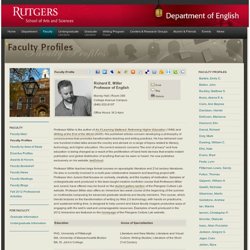
His published articles concern developing a philosophy of consciousness that promotes transformative teaching and writing practices. He has delivered over one hundred invited talks across the country and abroad on a range of topics related to literacy, technology, and higher education. His current research concerns "the end of privacy" and how education is being changed as a result of the proliferation of hand-held devices that enable instant publication and global distribution of anything that can be seen or heard. He now publishes exclusively on his website, text2cloud . Professor Miller teaches large format courses on apocalyptic literature and 21st century literatures. NCSS Position Statement on Media Literacy. A Position Statement of National Council for the Social Studies© 2009 National Council for the Social Studies.
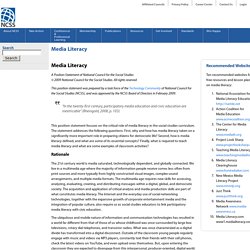
All rights reserved This position statement was prepared by a task force of the Technology Community of National Council for the Social Studies (NCSS), and was approved by the NCSS Board of Directors in February 2009. “In the twenty-first century, participatory media education and civic education are inextricable” (Rheingold, 2008, p. 103) This position statement focuses on the critical role of media literacy in the social studies curriculum. The statement addresses the following questions. National Council of Teachers of English - Homepage.
Edweeksjsd - home. The Fischbowl. Dean Shareski Presentations.